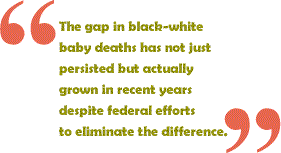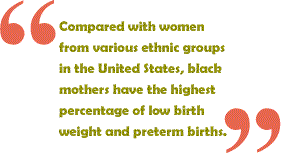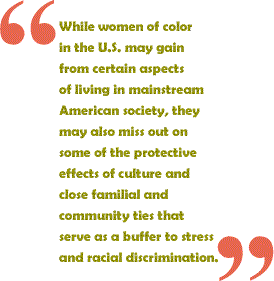 Sophie
Womack, 48, was surprised when in 1985 her first child, Brandi,
was born three weeks shy of her due date and six ounces below normal
birth weight. The Detroit mother had received timely prenatal care
and was in good health throughout her pregnancy. Yet her baby was
premature. Then, two years later, Sophie's second child, Ashley,
also entered the world too small and too early. "In spite of
the fact that I ate well and otherwise was healthy, I still had
two relatively small children," she recalls.
Sophie
Womack, 48, was surprised when in 1985 her first child, Brandi,
was born three weeks shy of her due date and six ounces below normal
birth weight. The Detroit mother had received timely prenatal care
and was in good health throughout her pregnancy. Yet her baby was
premature. Then, two years later, Sophie's second child, Ashley,
also entered the world too small and too early. "In spite of
the fact that I ate well and otherwise was healthy, I still had
two relatively small children," she recalls.
This
pattern seemed particularly odd since Sophie was a neonatalogist,
a type of doctor who specializes in the development of newborns.
As a physician, she knew a great deal about how to prepare for pregnancy
and childbirth. She just didn't fit the profile of a mom of low
birth weight children: She wasn't too young. She wasn't poor. She
was educated and had medical care. Yet Sophie had one key risk factor
that seemed to cancel out all the positives: She was black.
African
American women have long had higher rates than whites of low-birth
weight and preterm babies, the leading causes of infant mortality
or death in the first year of life. This fact does not seem extraordinary
considering the long list of other well-documented health disparities,
including life expectancy and various disease incidence rates. But
a recent study published in the Journal of the American Medical
Association reported that one particular disparity - the gap in
black-white baby deaths - has not just persisted but actually grown
in recent years despite federal efforts to eliminate the difference.
As the journal authors noted, that long-standing inequality is not
readily explained by a mother's age, education or income.
While
many ob/gyns and health experts point to causes like the timing
of prenatal care or unequal health insurance access, others are
asking broader questions about race, racism, and health. These more
complex questions may begin to explain why in a country with one
of the most advanced health care systems in the world black babies
remain the most vulnerable, and such racial health disparities simply
refuse to go away.
Medical
mystery
 An
infant's survival and long-term health is influenced by many factors,
including the mother's age, health status and behavior during pregnancy.
The two most significant determinants of a young baby's health and
development, however, are birth weight and gestational age at birth.
Infants born at or before 37 weeks, or under 2,500 grams (5 lbs.,
8 oz.), are at greater risk of medical problems, disability, and
death before their first birthday. Compared with women from various
ethnic groups in the United States (Hawaiian, American Indian, Puerto
Rican, Filipino, Mexican, Cuban, Japanese, Chinese and non-Hispanic
white), black mothers have the highest percentage of low birth weight
and preterm births. In 2000, more than one in ten black infants
was born too small and nearly one in five was born before the ideal
time.
An
infant's survival and long-term health is influenced by many factors,
including the mother's age, health status and behavior during pregnancy.
The two most significant determinants of a young baby's health and
development, however, are birth weight and gestational age at birth.
Infants born at or before 37 weeks, or under 2,500 grams (5 lbs.,
8 oz.), are at greater risk of medical problems, disability, and
death before their first birthday. Compared with women from various
ethnic groups in the United States (Hawaiian, American Indian, Puerto
Rican, Filipino, Mexican, Cuban, Japanese, Chinese and non-Hispanic
white), black mothers have the highest percentage of low birth weight
and preterm births. In 2000, more than one in ten black infants
was born too small and nearly one in five was born before the ideal
time.
This
disparity has long been the case. Historically, while African-American
moms have been stereotyped as "fertile Myrtles," they've
had consistently poorer birth outcomes, including more low birth
weight babies, very low birth weight (at or less than 3 lbs. 5 oz.)
babies and infant mortality. In 2000, the rate of infant death for
blacks stood at 13.6 per 1,000 live births - double the rate for
the general population, and almost triple the rate for whites. (Even
the group with the next highest infant mortality rate - Hawaiians
with a 9 per 1,000 baby death rate - fare far better than blacks.)
[Infant
mortality rate rankings by nation]
However,
the usual explanations for the disparity-income, education, late
prenatal care-don't come close to identifying why even professional,
middle-class black mothers like Sophie continue to experience the
two to threefold higher risk of having a small baby than white moms.
Research has debunked the notion that socioeconomic status and related
factors are the source of the problem. Consider these facts:
-
College- and graduate-school educated black mothers have a higher
infant mortality rate than white moms who didn't finish high school
-
Black women who get prenatal care in the first trimester have
double the infant mortality rate of white mothers with first-trimester
care
- Black
women with similar levels of prenatal care as Hispanic women (generally
less educated and with lower incomes than blacks) have higher
rates of low birth weight, preterm deliveries, and infant mortality.

According
to Dr. Michael Lu, assistant professor of obstetrics and gynecology
and public health at UCLA, researchers have found that even when
they control for such varied factors as poverty, housing, employment,
medical risk, abuse, social support and so on, 90 percent of the
differences in birth weight between black and white moms remains
unaccounted for. "Most studies have looked at black-white differences
during pregnancy, for example, differences in prenatal care utilization
or maternal behavior," he says. "What we're finding is
that these differences really explain very little of the disparities
in birth outcomes."
Even
genetics fail to provide answers. To test the hypothesis, Dr. James
W. Collins, Jr., associate professor of pediatrics at Northwestern
University Medical School, compared birth outcomes of African American
and Africa-born mothers in Illinois over a 15-year period. He assumed
if there was something about African genes that caused poor birth
outcomes, the statistics for African-born women might actually be
worse. But Collins and his colleagues found that the babies of African-born
women had birth weights similar to those of white American women
and higher than those of black American women.
A
different paradigm
To
probe the underlying cause of excess black infant mortality some
experts are beginning to look beyond individual women's risk factors
at the time of pregnancy to a more complete, long-term perspective
on women's health. "Healthy women beget healthy children,"
says Lu. "So when you start to talk about the health of the
mother, you have to really look at her life course experiences,
and some of that actually depends on the health of her mother."
It's
known,
for example, that a child is more likely to be born low birth weight
if her mother was also born that way. If the cause is not a shared
gene, perhaps it's a shared experience. For instance, the immune
system begins to develop in utero and matures over time. During
 certain
critical periods of development, Dr. Lu points out, the immune system
can be adversely affected by certain experiences and exposures,
such as repeated infections or undue stress. These exposures may
pattern the immune system in a particular way that sets the stage
for increased risk to poor health and poor birth outcomes. A mother
with less than optimal immune response may give birth to a baby
with less than optimal immune response and so on.
certain
critical periods of development, Dr. Lu points out, the immune system
can be adversely affected by certain experiences and exposures,
such as repeated infections or undue stress. These exposures may
pattern the immune system in a particular way that sets the stage
for increased risk to poor health and poor birth outcomes. A mother
with less than optimal immune response may give birth to a baby
with less than optimal immune response and so on.
Chronic
emotional stress results from many factors, including physically
demanding jobs and a lack of control in the workplace, single parenthood,
and financial worries - all problems experienced disproportionately
by women of color. Discrimination is also a documented source of
harmful stress. One study found that women who gave birth to very
low birth weight babies were more likely to have experienced racial
discrimination than women who had normal weight babies.
Sophie
Womack acknowledges that the related issues of discrimination and
stress may explain, in part, why even she and many of her fellow
black physician friends all gave birth to small babies despite their
education and higher incomes. "As a black woman going into
the field of medicine and stepping out into the world, we're constantly
trying to accomplish and do well because we're afraid if we don't
do well that we may be discriminated against," she says. "I'm
sure that plays some role in the amount of stress that we have during
the time that we're in training and trying to develop our careers.
It's just not very easy. And those things do factor into what happens
in our pregnancies."

While
women of color and their health advocates can't undo centuries of
discrimination or the stress it causes, they can begin to recognize
the complexity of the problem. "For about 20 years, our model
of prenatal care says if only we can give women universal access
to early and adequate prenatal care, if we get them to the doctor's
office, if we can enhance quality of prenatal care that they get,
somehow we improve the birth outcomes," says Dr. Lu. "But
to expect that one visit once a month to once a week, in less than
nine months, to reverse all the cumulative disadvantages and inequities
over their life course is probably expecting too much of prenatal
care."
Closing
the gap
To
counter low birth weight, prematurity, and infant mortality among
blacks and other women of color, the health care system must go
beyond narrow messages about prenatal vitamins and visits. Doctors
can talk to women about preconceptual health and the importance
of identifying and treating medical conditions, such as hypertension
and diabetes, prior to pregnancy. The medical community also needs
to confront the now-proven pattern of bias in  medical
care. While the Institute of Medicine uncovered discrimination in
such areas as cardiac care, less well-publicized studies have found
discrepancies in prenatal care and high-risk obstetrics. White mothers
in preterm labor and white newborns with life-threatening conditions
such as respiratory distress syndrome by and large receive better
care.
medical
care. While the Institute of Medicine uncovered discrimination in
such areas as cardiac care, less well-publicized studies have found
discrepancies in prenatal care and high-risk obstetrics. White mothers
in preterm labor and white newborns with life-threatening conditions
such as respiratory distress syndrome by and large receive better
care.
Public
health providers can take a cue from successful programs, such as
the Black Infant Health Program (BIH). Based in San Diego, BIH helps
women with whole-life issues such as applying for health insurance,
accessing transportation to their doctor's office, and finding drug
treatment programs. From the time a woman enters the program and
through the first year after birth, she can expect home visits from
nurses and services such as support groups. By assisting women with
a range of issues, including housing, child custody, marital and
work problems, the program has seen a small but demonstrable increase
in the birth weight and viability of black newborns in San Diego.
Another
key area is culture. Research by Dr. Collins and others has shown
that while some foreign-born women (specifically African and Mexican
women) have babies with better birth weights, the birth outcomes
of their daughters show a decline. The same is true of Native
American women who leave reservations. While women of color in the
U.S. may gain from certain aspects of living in mainstream American
society, they may also miss out on some of the protective effects
of culture and close familial and community ties that serve as a
buffer to stress and racial discrimination.
RaceWire
Home Page: http://www.arc.org/C_Lines/racewire/index.html
Colorlines
Home Page: http://www.arc.org/C_Lines/ArcColorLines.html
Infant
mortality rate rankings by nation:
http://www.geographyiq.com/ranking/ranking_Infant_Mortality_Rate_aall.htm

www.blackcommentator.com
Your
comments are welcome. Visit the Contact
Us page for E-mail or Feedback.
Click
here to return to the home page

